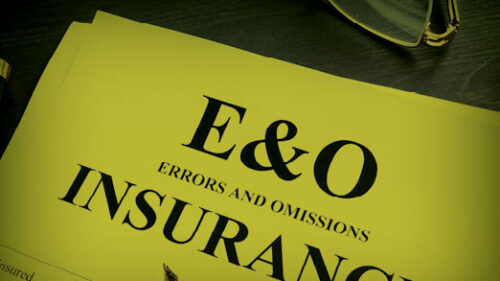It’s been commonly understood within most organizations and the insurance community that if an organization is providing a professional service to others for a fee, they need some form of professional liability insurance.
Medical professionals need Medical Professional Liability insurance; architects and engineers need Architects & Engineers Professional Liability insurance; accountants, lawyers, real estate agents, and even insurance brokers need a policy in place to protect them from claims alleging a negligent act, error, or omission in the performance of their products or services. This all makes sense, right?
What’s not understood is this similar need for Errors & Omissions (E&O) insurance for those organizations that aren’t providing a professional service to others.
Why Is Errors & Omissions Insurance Important?
Take for example a medical products manufacturer. Everyone can agree they need General Liability insurance (products liability can be included or written on its own) to protect them for claims alleging their product caused bodily injury or property damage to a third party.
But what if there is no property damage or bodily injury? What if the only damage to the medical products manufacturer’s client is purely financial in nature simply because it doesn’t work or meet the specifications as outlined by their client? What kind of insurance would be needed?
Another example would be a contract manufacturing organization (CMO) supplying a customer with a radioactive sulfate that was less radioactive than their label indicated. What if this produced unsatisfactory results in their client’s experiment, forcing their client to repeat their work? If the CMO had only purchased Products Liability insurance, there would have been no policy available to provide defense and claim settlement coverage on the CMO’s behalf.
In this case, if they purchased E&O, then the claim would be covered. And keep in mind, these claims can be hundreds of thousands of dollars.
General Liability Vs. Errors & Omissions Insurance
When differentiating between General Liability and E&O, it’s helpful to start with the basics of the policy trigger.
To trigger a General Liability policy, there needs to be property damage or bodily injury suffered by a third party. Think of E&O as the gap filler — the policy that can be triggered for pure economic loss.
Below is a list of some common allegations that would NOT be covered by a traditional General Liability policy:
- Damage to intangible property
- Loss of use of uninjured tangible property
- Loss of profits
- Breach of duty under law (tort) or contract
- Product failure to meet specifications
- Design or implementation errors
- Negligence of suppliers or contractors
- Actual or suspected defects, deficiencies, inadequacies, or dangerous conditions in the absence of physical damage
This is where E&O insurance would come in handy.
The bottom line is this — an organization’s General Liability policy isn’t the “catch all” policy that many brokers and organizations believe it to be. Not only that, but many contracts are now not only requiring the standard General Liability insurance, they’re also requiring E&O be carried as well. Why?
Because organizations are starting to understand that claims for financial injury caused by an act, error, or omission of an actual or suspected defect in a company’s product will not be covered by a General Liability policy due to specific exclusions and the lack of damages trigger for pure financial injury.
Many carriers have solutions to simply add E&O coverage to the General Liability policy because of this gap. In some cases, it can also be purchased separately. And while we’re at it, let’s not forget about Cyber Liability insurance and the increased need to purchase for all organizations — regardless of industry.
Working with a Partner Who Understands Errors & Omissions
The structure of these coverages varies by insurer and by the unique needs of each insured organization. So, working with a broker who understands not only the insurance piece, but also your industry and contractual obligations is crucial to protect your organization.
Holmes Murphy understands all the pieces involved. If you have questions or need help, please don’t hesitate to reach out to us. We’re happy to help you in any way we can!







